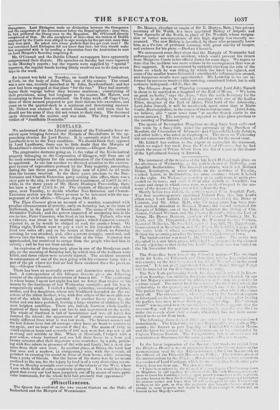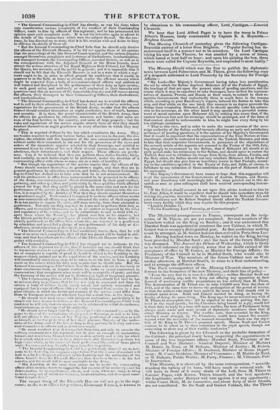In the latest impression of the ....zpeeeit rIa t w
Cc., "lVe col,led from the Brighton Herold a report profess: ate to e.eltala tn.; sahqamtee of the memorandum read by the Adjtiteei-e:eme .1. :sir .7ohn Macdomild, to the officers of the Eleventh Hussars on [rid ;;.•. Tbs versbem given of the memorandum by the rifli■,'L ou the emiduet of Lord Cardigan. w 'L.: ..er.o..lato it sinee pub- lished, does not bear out. We eive it dire. " I have heen ordered by die It C•;.. :1.11.-:.11•1,1- Chief to come down
Ii, Brighton, to call togetder the 111,....;n:11 Hussars, and to ex- ; press to them his Lordship's •;pon reecht rainiactions ia the regiment,
to make known to them his Lerdship., at soggistions, and to express his anxious wishes and hopes that nil v it I so fir proal by ,11.1; 1 have to say to them on his part, as that this re:-inient may hereafter Is. come what it is already in some respects, mid might h., in all, an eNample to others and an honour to her Majesty's service.
" The General Commanding-in-Chief has already, as was his duty, taken into cousidsration various complaints of the ,conduct of their Commanding Officer, made to him by officers of this regiment; and he has pronounced his opinion upon each complaint made. It is not his intention again to advert to the details of the transactions which were the subject thereof. On the con- trary, be has directed me to state, that it is his anxious wish and desire to bury in oblivion the details of them all.
" But the General Commanding-in-Chief feels that he should only deceive the officers of the Eleventh Hussars, if be did not apprise them of his opinion that the proceedings of the late General Court-martial, and the various disputes amongst themselves, complaints and instances of disobedience, insubordination, and disrespect towards the Commanding-Officer, recorded therein, as well as in the correspondence with the Adjutant General at the horse Guards, must attract the serious attention of his Royal Highness their Colonel, her Majesty the Queen, her servants, and the public in general ; and it is impossible that it should not be felt that the Eleventh Hussers is not in a state in which a regi- ment ought to be, in order to afford ground for confidetice that it would, in quarters or in the field, at home or abroad, render the efficient service which might be expected from a body of non-commissioned officers and soldiers 80 well trained and disciplined in the performance of their duty as light cavalry, in such good order, and uniformly so well conducted in their barracks and quarters—and this on account of the lamentable disputes and differences among the officers, their disrespect to their Commanding- Officer, their disobedience, and insubordination.
" The General Commanding•in- Chief has desired me to remind the officers, and to call to their attention, that the Mutiny Act, and II e rules. articles, and regulations for the government of the British Army, ria,uire that the officers thereof should conduct themselves as ought gentlemen, men of truth, honour, and morality. It is, then, the proud characteristic of the British Army, that iits officers are gentlemen by education, manners, and habits; that some are such of the first families in the country, and some of large property ; but the rtkies and regulations of the service require strictly from all that they should conduct themselves as ought gentlemen in every situation in which they may be placed. " This is required of them by the law which cnnstitutes the Army. They are besides required to perform various -hales and services in the care, the dis- cipline, the comfort, and the happiness of the non commissioned officers and soldiers under their command, in aid and for the promotion of the views and orders of the immediate superior selected by their Sovereign, and entitled to command them by virtue of his al their several commissions, and to their obedience, their subordination, and their respect. These officers are gentle- men. Can it be believed that they can perform these duties frankly, fairly, and cordially, as such duties ought to be performed, under the direction of a commanding officer with whom so many are in a state of hostility ? " But though the regulations of the service require that the officers of the Army should conduct themselves as gentlemen ought, and that they are in general gentlemen by education, manners, and habits, the General Command- log-in-Chief has desired nte to take care that he is not misunderstood. Ile and his predecessors in offire have recommended to be promoted to be officers of the Army, non-commissiotod officers distinguished by their good conduct, gallantry, and other qtiaUties, and particularly by those qMdities which afforded ground for hope that they could he placed in the same class and rank for the performance of the service as those from whom, on their entrance into the see- vice, it is required by the Articles of lit'ar that they should conduct themselves as gentlemen ought. Sitch conduct is requirtd from those officers whose merits as tion-commissim ed officers may have attracted the ootice of their superiors. It is but justice to require the same, still more strictly, from those educated as gentlemen. Not only are they required to I. tan and to perform their duty as officers, and to conduct themselves eatle in his :station as required by the rules and regulations of the service, and to be subordinate to and to treat with re- spect those whom the Savereig:i has placed over him as Ida superior, but the British public feel a greater dogree of emitlibitice that ti sd ditties will lie strictly performed, as the officer from whom they are requite ii is a gentleman by education, and 01LIA feel a charge of non-performance of his duty or dis- obedience, insubordieat ion or ditotespect, as a stigma. " The General Commanding-in • Chief confidently trusts, then, that he will hear of no more such complaints; that all that has passed will be buried in obli- vion, and that henceforward the officers of the Eleventh Hussars will serve to- gether with cordiality. " The General Cornmanding-in-Chlef has charged me to intimate to the officers of this regiment his desire, t hat if hereaftir any one should think that be Las serious reason to complain of hi Commanding Meer, rind that the mat- ter of complaint is capable of proof, it sletuld be stuted to his Lordship in the manner clearly pointed not in the mg alit ii of the service, and his Lordship will immediately order those steps to lit taken to en iIde ben to form a judg- ment on the course which his duty nlay require that be should take. But the General Commainting-in-Chief t 11.-t,, that the officers, at ill not he too ready to draw conclusions from, or impute emtives to, looks UI casual expressions in conversation ; that ecu upiaiuu ts wilco made will be susceptible of proof; and that the harmony of the ;run, he ',ill nut be disturbed on light or imaginary grounds. " The Commanding Ohicer of the Eleventh Ilussios should feel that he has an arduous duty to ye: Form ; that he hit, tat only to command and form for service a body of so!,li,r, t'early neeilv rd .el, and entirely remounted and equipped, but a corps ntlicer, either r,v,•ntly returned fr.on service in a tro- pical climate, in which the habits and custom; of the service must differ from those in European service, or who have ken hut a short time in the Army. " He should view their errors tic ith indulgent moderation ; particularly il he should not have reason to believe, a; the General Commanding-in-Chief feels coulitletit he will not, that the error; dr: to he attributed to wilful disobedience, insubordination, or disrespeet of his intthority. "Be should never iuurget that tits, p!,,,:ed nu .r emumand it,.e so hy the grant to them of the commissions it enti g,avh,a= Suer ,.0 as well as to him- self, are officers in the s,re:ce of leer gentlemen of education as well as himself', under the prot,,ti,m of Ii r most gracious llajt,tr, of the autho- rities of the Army, and of the law, as long as they perform their cloty and con- duct themselve4 as officers find ia gentlemen onOtt. " lie must recollect that it is expected froM him, not only to exercise the military (Ammond over this regimem, bat to gl ve au example of moderation,
temper, and discretion, Idenned with the ixalmi, activity and for which he is noted, which will tend to for.t, oti,e1:- to la aide herealter to perform the
high duties which, in the cour,e t heir v.oli.—ional life, (itch of those placed under Ids command tin I. call, :I u 5. 11,11 riiu Putt'). " The General Coninianding-iit-tit t p .rticularly direeled me to inti- mate to his LordOdp. hi, eijuhue e ti.at thi, course orconduct will lead to a far less frequent rt•f.rLI,I.I! ii iii, Lordship and the authorities or the florae Gnosis from the Peventh 11n—cir, than his hemi the cn-,: in the last months, and the result will IP. 1111/T.• erOlitaid,! 1'0 the Aroly• " His Lordship at the same time orders me to fts,ure IL, commanding officer of his anxious desire to suppott the fair exercime of his au ; and his determination to di,countenam,e, check, and even, when nee. ssary, to luring to trial, every act of wilful disiihedienee, insubordination, and dkihspeet nutni• feted towards Ian."
The vacant troop of the Eleventh Hus:mrs will not go in the regi- ment; as the next officer for purchase, Lieutenaut Forrest, is known to
be obnoxious to his commanding officer, Lord .Cardigan.—Linterick Chronicle.
We hear that Lord Alfred Paget is to have the troop in Prince Albert's Hussars, lately commanded by Captain It. A. Reynolds.-- Brighton Gazette.
The Morning Chronicle of yesterday gives the following Cardigan- Reynolds extract of a letter from Brighton. "Popular feeling has de- monstrated itself in a manner not to be mistaken. On Lord Cardigan taking his seat in the Theatre, he was assailed by a storm of hisses, which lasted at least half an hour ; and upon his quitting the box, three cheers were called for Captain Reynolds, and responded to most lustily."
.11



























 Previous page
Previous page